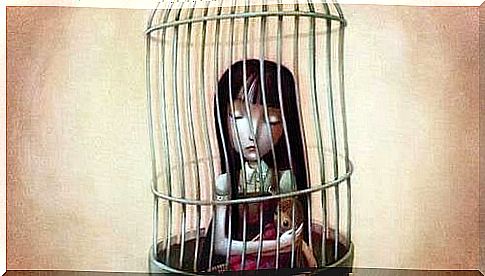Invisible Family Loyalties: The Expectations That Imprison Us

Many readers may have experienced firsthand that loyalty or closeness to a family member prevented their fulfillment. In psychology, this has a name: invisible family loyalty.
Invisible family loyalty is the set of beliefs and inhibitions that shape the way we view ourselves and the behaviors of our emotional reality (both the one we are experiencing and the one we desire). In other words, we inherit the problems from our family members.
We accept certain conditions for fear of losing the love, attention and favors of our family members (parents, grandparents, siblings, etc.). Naturally, this responds to an evolutionary fear: no one wants to be disowned from their core.
That said, people are capable of taking advantage of that emotional power, despite not having the intention of being cruel. In fact, we often don’t even realize how we play with family contracts. Let’s see the topic in detail.

The unspoken emotional contracts: a cocktail of expectations
The emotional contracts that are established between family members turn out to be a cocktail of high and conditioning expectations, a cocktail that is often harmful to a person’s fulfillment.
It happens that, when we talk to people who are totally external to our family, we realize how we structure our thoughts and behaviors regarding certain issues. Suddenly, we are surprised that we have made our own ideas that belong to our family, ideas that seem absolute to us, but which in reality are not.
It is extremely important to get rid of all preconceptions that are negative to us. Literature and cinema are clear examples of what many of us are forced to experience.

An example is the case of the artist repudiated by his family, because this aspired to continue his lineage of renowned doctors or even the woman who is forced to marry a man who supports her.
A person who does not have the courage to change cities for fear of hurting his family. A person who cannot live his love freely for fear of retaliation. A son who has to be passionate about football. An individual who wants to study a discipline “that has no future”. A person who has to get married, otherwise his life is meaningless.
Not to mention the labels: “the bad”, “the clever”, “the awkward”, “the beautiful”, “the good girl”, “the submissive”, “the ugly”, “the distracted”, “the poor person ”,“ the employee ”, etc.
When someone goes to the psychologist, there is always the possibility that the root (not the only cause) of their perturbation lies in dysfunctional patterns learned in their family context from childhood.
In other words, we perpetuate the shortcomings of our core, beliefs and expectations that are passed on to us. All of this is normal and, as we have already said, it is an evolutionary behavior. However, the fact remains that, having reached a certain point in our life, we must begin to ask ourselves questions about the world. Let us remember that, as children, this ability is not developed in us, but as adults it does.

Who I am? the question that is answered in dialogue
We are sponges that absorb beliefs and expectations, an element that works against us when invisible family loyalties are harmful to our growth. This has a direct consequence: we are what we see.
This is why we usually let ourselves be carried away by the inertia of what we have seen at home and that our family members have transmitted to us, without reflecting too much on it.
For example, there are those who believe that a partner should last a lifetime since their parents have always been together and have sacrificed their existence and their happiness for their children. If this person, at some point, gets caught up in a harmful relationship, they will have a hard time understanding that they don’t have to continue.

Whether or not you have noticed the existence of these invisible family loyalties, the important thing is that you know who you are and why you have become accustomed to behaving a certain way. If you see that you respect everything that you have absorbed and that this attitude does not make you happy, the best thing to do is to detach yourself from that context.
You can do this by writing a letter, engaging in dialogue or conversing with yourself. This will help you get rid of the invisible family loyalties that haunt you. If you think you are not capable of it or if it does not seem sufficient, it is necessary to speak to a professional who will help you to give an emotional coherence to what happens to you.









